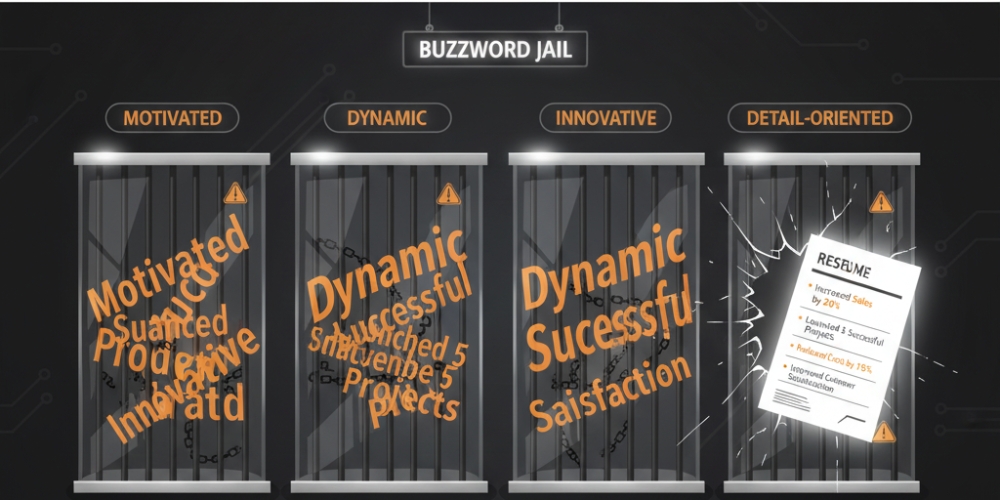
TL;DR
- Using buzzwords for a resume like “results driven” without proof hurts credibility.
- Resume cliches and buzzwords make your profile look weak to recruiters and AI tools.
- Recruiters use tools to find real results not vague phrases.
- Show measurable impact instead of generic words to avoid on a resume.
A candidate sends out their CV filled with lines like “dynamic team player”, “visionary leader” and “driven professional”. What they don’t see is that these same resume buzzwords to avoid make their CV disappear in a pile of identical ones. These phrases are worn out, say little about skill, and quietly lower their chances of standing out.
Now imagine hiring teams equipped with smarter screening tools that look past the jargon and catch what really matters: demonstrated results, real roles and tangible achievements. In this blog, you will learn what those buzzwords are, why they hurt, how recruiters can see past them and what job seekers should do instead, all while thinking about the good resume vs bad resume scenario in plain terms.
What Are Resume Buzzwords (and Why They Hurt Your Chances)?

When people talk about “resume buzzwords”, they mean the kind of phrases and adjectives that sound impressive but say little, for example, “strategic thinker”, “go-getter” or “passionate professional”. Because these terms are so common, they fall into the category of resume phrases to avoid. They do little to prove your value.
Here’s why they hurt:
- Recruiters spend on average only 6-7 seconds scanning a resume before deciding if they move on.
- Modern screening software such as an Applicant Tracking System (ATS) with ATS integration, looks not just for keywords but context, relevance and specificity.
- Using buzzwords without proof makes your case weaker, because as one article puts it: “If you have to tell people you are something, you likely aren’t that something.”
- For a recruiter, a candidate who simply lists generic qualities triggers fatigue. One study found that 73% of hiring professionals reported seeing the same words repeatedly and getting turned off.
Buzzword Detector — Mini Quiz
Pick the stronger option for each question. Then tap “Check answer”.
Q1 · Which phrase tells you nothing about skill?
Q2 · Which version gives proof of ability?
Common Resume Buzzwords to Avoid

Here’s a helpful table summarising frequently overused terms. These appear under the broader issue that keywords should never be repeated in a résumé without proof and they also tie into the notion of a resume antonym, meaning what your resume is not (generic, vague, overstated).
Common Resume Buzzwords to Avoid
Swap vague phrases with clear, measurable results.
| Buzzword / Cliché | Why to Avoid It | What to Use Instead |
|---|---|---|
| “Results driven” | Too broad and overused. Says little about actual impact. | “Delivered a 20% rise in revenue in 12 months by…” |
| “Team player” | Generic claim with no proof of contribution. | “Collaborated with a 5 member team to reduce errors by 15%” |
| “Motivated self starter” | Common phrase that lacks measurable evidence. | “Started a volunteer program that grew to 50 members” |
| “Detail oriented” | States a trait without showing how it helped work quality. | “Identified 250 report issues and saved 80k dollars” |
| “Passionate about” | Focuses on emotion not performance or outcomes. | “Led outreach that increased client retention from 75% to 88%” |
Note: This table is a sample of common traps. Use it to audit your own document and replace empty language with concrete examples and metrics.
How Recruiters Can See Past Resume Buzzwords

As a recruiter or talent acquisition professional, spotting and filtering out the fluff is essential. Here’s how to move beyond the superficial and get to real value.
Look for proof not pitch
Instead of accepting statements like “strong communicator”, examine whether the bullet point describes how, when and what improved thanks to communication. A clear example beats an empty claim.
Use screening tools smartly
When your team uses ATS systems with strong ATS integration, you can flag resumes that contain overused phrases without context. One report shows that 88% of employers believe they are losing out on qualified candidates because resumes were not ATS-friendly.
At the same time, you should calibrate filters so that they don’t blindly punish candidates who use synonyms but add real value.
Watch for generic redundancy
If a resume reads like a list of claims (“experienced”, “dynamic”, “proactive”) without specifics, it may signal that the candidate is hiding weak evidence. Studies show that… up to 75% of qualified candidates are auto-rejected because… automated systems focus too heavily on keywords rather than context.
Tune your questions accordingly
When the interview call comes, ask for examples like “Give me a time you improved X metric” rather than “Are you a team player?” This avoids being misled by pep talk and focuses on proof.
Educate hiring managers
When you brief hiring teams, provide them with guidance on recognizing the difference between resume filler and meaningful achievement. Encourage focus on outcome, metrics and ownership.
By using these practices, you can move from simply filtering hundreds of resumes to identifying candidates whose content reflects real performance not just flattering language.
How Recruiters Can See Past Resume Buzzwords
Compare two short resumes. Pick the one you would shortlist.
| Resume A · Buzzword Heavy | Resume B · Achievement Focused |
|---|---|
| Dynamic team player with a passion for excellence | Co-led a 5 member team and cut report errors by 15 percent |
| Results driven self starter with strong leadership | Delivered 20 percent revenue growth in 12 months |
| Innovative problem solver who thinks outside the box | Automated a monthly report and reduced cycle time from 5 days to 2 |
| Excellent communicator with stakeholder management | Ran weekly client reviews and raised satisfaction to 4.7 out of 5 |
| Detail oriented professional with a can do attitude | Found 250 data issues and prevented 80k dollars in losses |
| Strategic thinker with a track record of success | Built a retention plan that lowered churn by 10 percent |
| Reads like claims without proof | Shows measurable outcomes and ownership |
Best Practices for Job Seekers

If recruiters are learning to spot the fluff, job seekers need to stop serving it. Here’s how to write a good resume vs a bad resume and keep yourself out of the reject pile.
Be Specific, Not “Special”
Avoid the buzzword list altogether by showing not telling. Replace “excellent communicator” with “presented weekly sales reports to a 10-member team, helping secure three new contracts.” Specific numbers prove ability far better than inflated adjectives.
Match the Job Description Smartly
Tailoring your resume to fit a job post does not mean stuffing it with every phrase they used. Instead, focus on context. Mention skills with measurable results and tie them to business impact. Remember, keywords should never be repeated in a résumé without meaning. Repetition looks artificial and most applicant systems flag that pattern as spammy.
Replace Fluff with Facts
If you wrote “innovative problem solver,” replace it with an example of innovation. Did you reduce a workflow from 5 days to 2? That’s the kind of line hiring managers remember. Using measurable verbs like “delivered,” “reduced” or “built” turns a weak claim into a strong statement and improves your visibility even in blind resume screening.
Keep It Human-Readable
Remember that while software does the first pass, a human will eventually read your resume. Over-optimizing for algorithms can make your tone robotic. A bad resume reads like a keyword salad while a good one reads like a clear story of your growth. Think human first and algorithm second.
Use Soft Skills with Context
Soft skills still matter but without real-world examples, they sound like filler. Instead of listing “leadership,” describe when you led a cross-department project or trained a new hire. The skill should appear naturally through your actions not as a floating label.
How Vettio Helps Recruiters Go Beyond Buzzwords

At Vettio, the focus isn’t on judging resumes by how catchy the words sound but on reading between the lines. Vettio’s AI-powered hiring intelligence helps recruiters evaluate candidates on substance not style.
Context-Based Analysis
Vettio’s model reads resumes and job descriptions together. It understands whether “strong communicator” means leading client calls, managing cross-functional teams or running campaigns. This helps hiring teams identify candidates with actual performance outcomes rather than generic good resume buzzwords.
Real-Time Bias Detection
The platform’s blind resume screening module removes identifying details like gender, photo or age while maintaining job-related data. This ensures hiring managers make fairer, evidence-based decisions.
Deep ATS Integration
Because Vettio connects directly with major recruiting systems through ATS integration, it ensures data accuracy and consistent filtering. Recruiters can quickly see who matches the intent of the role not just who used the right buzzword in their resume.
Human + AI Partnership
AI doesn’t replace the recruiter because it amplifies them. By surfacing real achievements hidden under buzzwords, Vettio saves hours of manual screening time and gives every candidate a fair shot.
Conclusion
Buzzwords once sounded impressive but in today’s hiring world, they do the opposite. They blur individuality, block clarity and hide real talent behind empty phrases. Job seekers should focus on tangible examples, measurable impact and honest storytelling. Recruiters, meanwhile, can rely on tools that highlight truth over talk, giving them a sharper eye for substance.
Platforms like Vettio make it easier for both sides. For candidates who write better resumes and hiring teams who see real potential. In the end, the best hiring decision isn’t made by the person with the flashiest words but by the one whose work speaks for itself.
FAQs
Focus on results and measurable impact. Replace “team player” with an example of what you achieved as part of a team such as boosting efficiency or cutting costs. Concrete results make your story unique.
Yes AI helps recruiters look past surface level claims. It detects patterns in language and performance metrics that highlight which candidates back up their words with data.
Yes but always in context. Instead of listing “leadership” show how you led a project or mentored a colleague. Recruiters remember actions more than adjectives.




